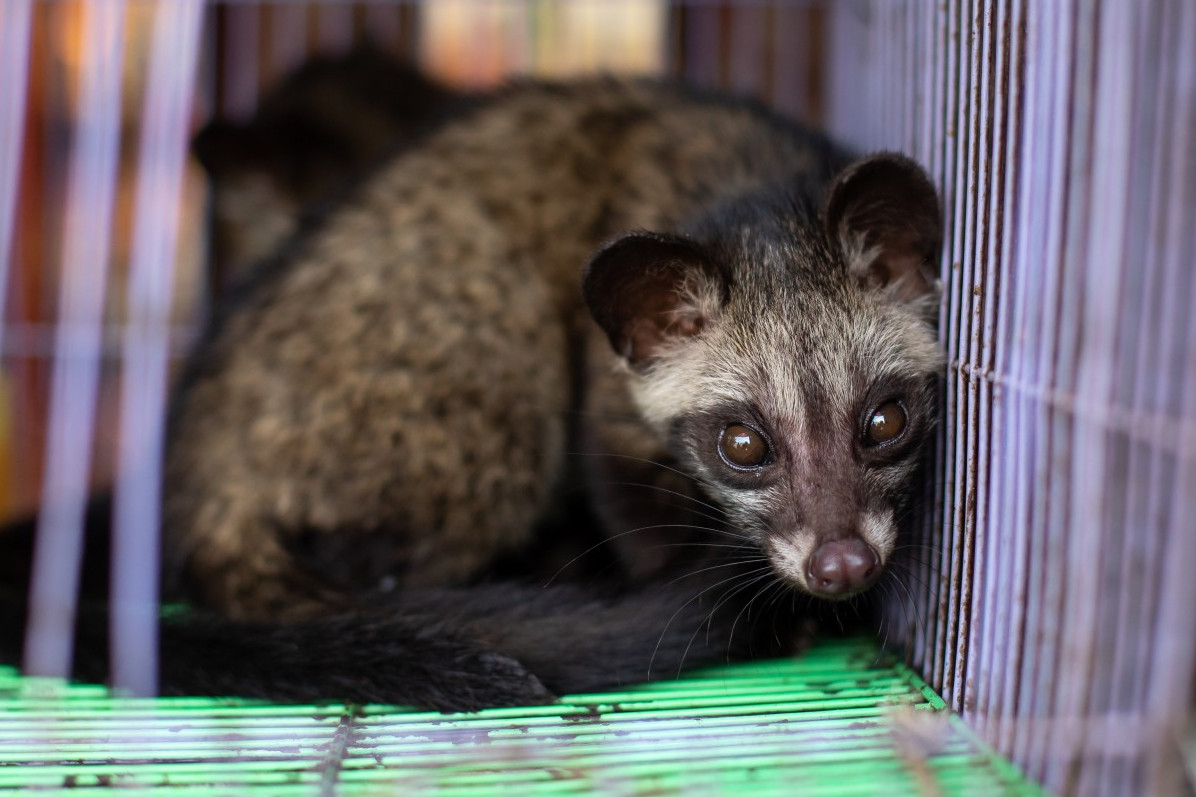
The global trade of wild animals is cruel and puts our health and the global economy at risk from pandemics like COVID-19.

The global trade of wild animals is cruel and puts our health and the global economy at risk from pandemics like COVID-19.
The wildlife trade is fuelled by the demand for exotic pets, traditional medicine and the entertainment industry. Millions of wild animals including lions, tigers, bears, parrots, snakes, lizards and even otters are captured each year for the wildlife trade. After being stolen from the wild, these animals are stuffed into bags, taken to cramped and unsuitable holding pens and crammed into crates and shipped all over the world with many animals dying en route.
Horrific conditions cause unimaginable suffering for wild animals in the exploitative wildlife trade, which is estimated to be worth US $7-23 billion a year. Factory-farmed bears have bile agonizingly drained from their gallbladder using a metal tube for traditional medicine. African grey parrots are caught with baited glue traps and have their flight feathers hacked off, to be shipped around the world in the exotic pet trade. Tigers are chained and drugged to pose with tourists. The exploitative trade and consumption of wild animals increases the risk of diseases passing to humans, leading to deadly outbreaks like SARS and now COVID-19.
COVID-19 has been a wakeup call for the world. It’s time to come together to end the cruel exploitation of wild animals by stopping the global wildlife trade, the cause of suffering to millions of animals that also endangers people across the world.
Demand an end to the global wildlife trade
A wild animal is a species without a history of domestication, a long process of genetic alteration through selective breeding by people for particular ‘desired’ traits. Generally speaking, it involves changes in both appearance and behaviour.
Wild animals bred in captivity retain their complex social, physical and behavioural needs, which are adapted to its specific natural habitat.
Our call for a global wildlife trade ban refers to wild animals that are involved in non-essential global commercial trade (e.g. for use as luxury goods, exotic pets, traditional medicine and entertainment) that have been bred in captivity or captured from the wild. We do not include plants, fisheries that supply the food industry, wild animals hunted by communities for subsistence, or other wildlife trade that is deemed essential for human survival.
The World Health Organisation (WHO) defines zoonoses as diseases and infections that are naturally transmitted from vertebrate animals (include birds, fish, amphibians, reptiles, and mammals) to humans. Over 60% of all emerging infectious diseases are zoonotic and up to 75% of these are thought to originate from wild animals.
The risk to global health from the threat of zoonotic diseases is part of every step of the wildlife trade, both legal and illegal, including capture, farming, transport, consumption and captivity.
Wildlife trade is a known threat to animal welfare, public health and economies, irrespective of how wild animals are sourced and sold. As well as the public health and conservation risk, wild animals are sentient beings who feel pleasure, distress, excitement, fear and pain and they suffer immensely in the billion-dollar wildlife trade.
Canada currently imports tens of thousands of protected live wild animals for commercial purposes, including primates, tortoises and Ball pythons, captured from the wild or farmed and legally imported into Canada each year. In addition, Canada imports hundreds of thousands of live wild animals each year that are not regulated by the Convention on International Trade in Endangered Species (CITES). Together, these represent a significant volume of international trade in wild animals.
Canada also imports large volumes of wild animal products such as crocodile and snake leather, wild animal skins and hunting trophies.
In 2020, following the outbreak of COVID-19, we launched a global initiative to call on world leaders to instigate a global wildlife trade ban at the G20 Summit. We are petitioning all the G20 governments, and to support this in Canada we also formed a coalition of Canadian and international animal protection organizations, academics, conservationists and zoonotic disease experts, all calling on the Canadian government to bring this issue to the G20 and take action nationally.
With the help from our supporters around the world, we are raising awareness and putting pressure on world leaders to implement and uphold a ban to end the wildlife trade and help prevent future zoonotic disease outbreaks.
A global trade ban would be a significant step towards the prevention of any further breeding of wildlife in captivity, the poaching of wild animals and the animal suffering and human health risks associated with these nonessential commercial activities. It would reduce the number of wild animals traded. Reputable companies and institutions will not want their brand or reputation to be associated with any illegal wildlife trade. However, such policy action would be only one component of a broader holistic approach. For example, it would need to be accompanied by strict enforcement regulations and behavioural change programs to drive down consumer demand in order to prevent the wildlife trade being driven underground.
© World Animal Protection
Tel: 416 369 0044 Email: info@worldanimalprotection.ca.
Canadian Charitable Registration #12971 9076 RR0001
Land acknowledgement for our Toronto office.